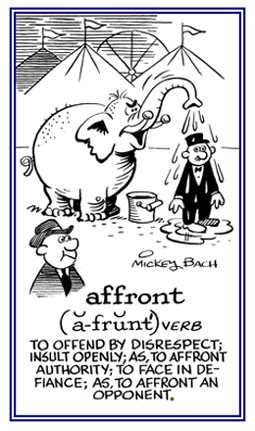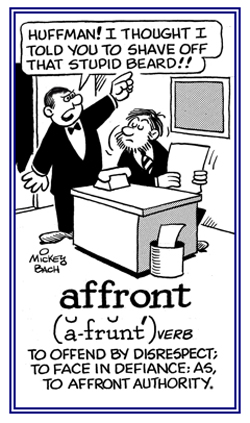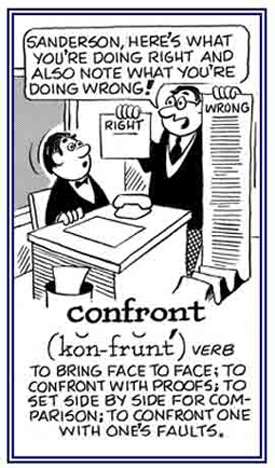front-, fronto-
(Latin: forehead, brow, the forepart of anything; that which projects)
A fronte praecipitium a tergo lupi.
A precipice in front, wolves behind.
Equivalent to: "Between a rock and a hard place." "Between the devil and the deep blue sea."
affront (s), affronts (pl) (noun forms)
1. Something insulting that makes a person shocked and angry: "The politicians were throwing so many affronts at each other, that many in the audience couldn't tolerate it any longer; so, they started to walk out."
2. An open or intentional offense, slight, or insult: "Karl's rejection of Mark's plan was a personal affront!"
2. An open or intentional offense, slight, or insult: "Karl's rejection of Mark's plan was a personal affront!"
Affront came from Old French afronter, "to push someone's face in"
By the time affront came into English (about 1300) it simply meant to insult someone to his or her face and it was ultimately derived from Latin frons, "forehead"; which is also the basis of the words front and frontal.
affront (verb), affronts; affronted; affronting
1. To intentionally insult someone; especially, openly in order to cause displeasure, anger, and resentment: Don't affront the speaker by asking him such rude questions.
2. To do or to say something which shows a lack of respect or consideration for another person's feelings: The customer was affronted by the salesperson's rude behavior.
3. Making an obvious and intentional offense, slight, or insult: The supervisor affronted his employee by saying, "Your proposals have no practical value; so, don't make such suggestions again".

© ALL rights are reserved.

© ALL rights are reserved.
Go to this Word A Day Revisited Index
2. To do or to say something which shows a lack of respect or consideration for another person's feelings: The customer was affronted by the salesperson's rude behavior.
3. Making an obvious and intentional offense, slight, or insult: The supervisor affronted his employee by saying, "Your proposals have no practical value; so, don't make such suggestions again".
Someone can insult another person in private; however, when anyone is affronted, it is done in public.
3. Etymology: fron Latin ad-, "to" + frons, "forehead"; originally "to confront a person face to face".

Go to this Word A Day Revisited Index
so you can see more of Mickey Bach's cartoons.
affronter
anterofrontal
arctic front
The semi-permanent, semi-continuous front between deeper, colder arctic air and shallower, less cold polar air of northern latitudes.
confront (verb), confronts; confronted; confronting
1. To meet someone face to face with hostile or argumentative intentions: Jacob confronted his brother and accused him of hiding his French book which he needed for school the following day.
2. Etymology: from French confronter; from Latin confrontare; from Latin con-, "with" + frons, front-, "face".

© ALL rights are reserved.

© ALL rights are reserved.

© ALL rights are reserved.
Go to this Word A Day Revisited Index
2. Etymology: from French confronter; from Latin confrontare; from Latin con-, "with" + frons, front-, "face".



Go to this Word A Day Revisited Index
so you can see more of Mickey Bach's cartoons.
confrontation
confronted
confronter
confronting
craniopagus frontalis
Conjoined twins united at the forehead.
A narrow, continuous sheet of sand that marks the zone where deposition in a delta is most active.
effront
effronter

